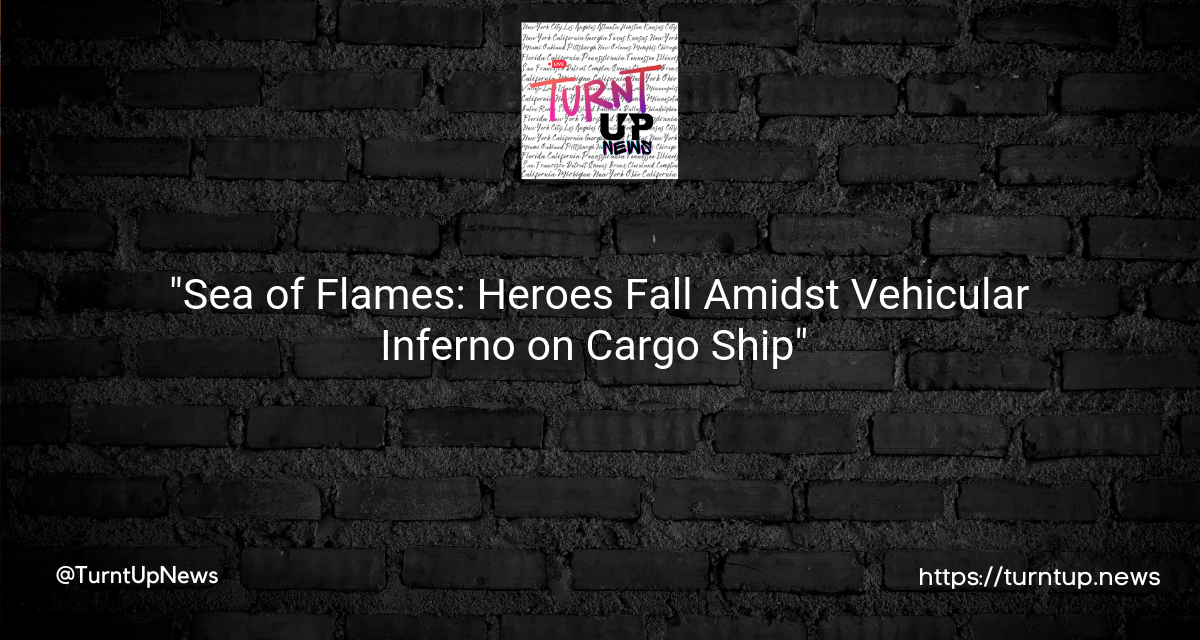🔥⚓️ “Sea of Flames: Heroes Fall Amidst Vehicular Inferno on Cargo Ship” ⚓️🔥
TL;DR: Two heroic Newark firefighters, aged 45 and 49, tragically lost their lives while combating a fierce blaze aboard the Grande Costa D’Avorio, a colossal cargo ship jam-packed with vehicles. Five other firefighters suffered burns and heat exhaustion in this dangerous endeavor. Despite the perilous nature of fighting fires on ships, these heroes made the bold choice to risk it all to protect life and property. 🚢🔥👨🚒
In the thick haze of a Wednesday night, two of Newark’s bravest, Augusto Acabou and Wayne Brooks Jr., paid the ultimate price. Answering the call of duty at the Port of Newark, they plunged headfirst into a burning abyss, a gargantuan cargo ship known as the Grande Costa D’Avorio. 🔥⛴️😔
The ship, an impressive beast spanning nearly 700 feet, was loaded with about 5,000 vehicles. Imagine the chaos, the immense heat, and the smoke that would generate! But can we grasp the enormous courage required to tackle such a hellish beast? 🚗🔥🚚
The call came in at around 9:25 p.m. Firefighters stormed the ship, making their way to the 10th or 11th floor, right into the heart of the inferno. Two mayday calls were heard, those chilling cries echoing amidst the blaze. Our heroes, Acabou and Brooks, had become lost within the fire. 🚒👨🚒😢
Five additional firefighters suffered burns, heat exhaustion, and smoke inhalation during this harrowing ordeal. It brings to mind the stark reality of the danger these men and women face every time that siren sounds. Makes you wonder, doesn’t it, what it takes to walk into the heart of danger so that others may live? 🤔👨🚒🔥
The Governor of New Jersey, Phil Murphy, conveyed his sorrow. He expressed his deep condolences to the families of the fallen firefighters and prayed for the speedy recovery of the injured. But these expressions of grief raise a question – are we doing enough to protect our frontline heroes? 😔💔🚒
Newark Mayor Ras Baraka also joined the chorus of mourning, reflecting on the painful images of the night’s events. His words capture the haunting scene – the lowered bodies of the firefighters from the towering ship, the solemn lined figures paying their last respects, and the grim reminder of the precarious and perilous nature of their duty. Is it time to reassess safety procedures, especially for uncommon fires like these? 🏗️🔥💭
Fighting a fire on a ship, as Newark Fire Chief Rufus Jackson stated, isn’t like fighting a land-based fire. Firefighters have trained for fires aboard vessels with living quarters, but a cargo ship full of vehicles? That’s a different beast altogether. How can we better prepare for these unique challenges in the future? 🚢🔥👨🚒
In a year that’s already seen six incidents with multiple firefighter fatalities, including three in Baltimore in January 2022, the stark reality of their sacrifice is a sobering thought. Is there more we can do to prevent such tragedies from recurring? 📆👨🚒😭
As we mourn the loss of our brave firefighters, we must ask ourselves – what changes can we make to ensure their sacrifices are not in vain? Is it time for a major shift in fire safety protocols, especially regarding uncommon fire scenarios like ship fires? And most importantly, are we prepared to make that change? 🚒🔥💭
Disclaimer: This article does not provide safety advice or recommendations. It recounts the events as reported and poses questions for thought and discussion. Always follow the guidance of trained professionals in emergency situations. 📝💡⚖️





